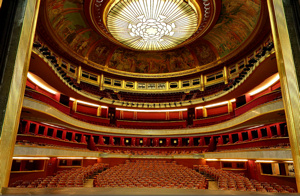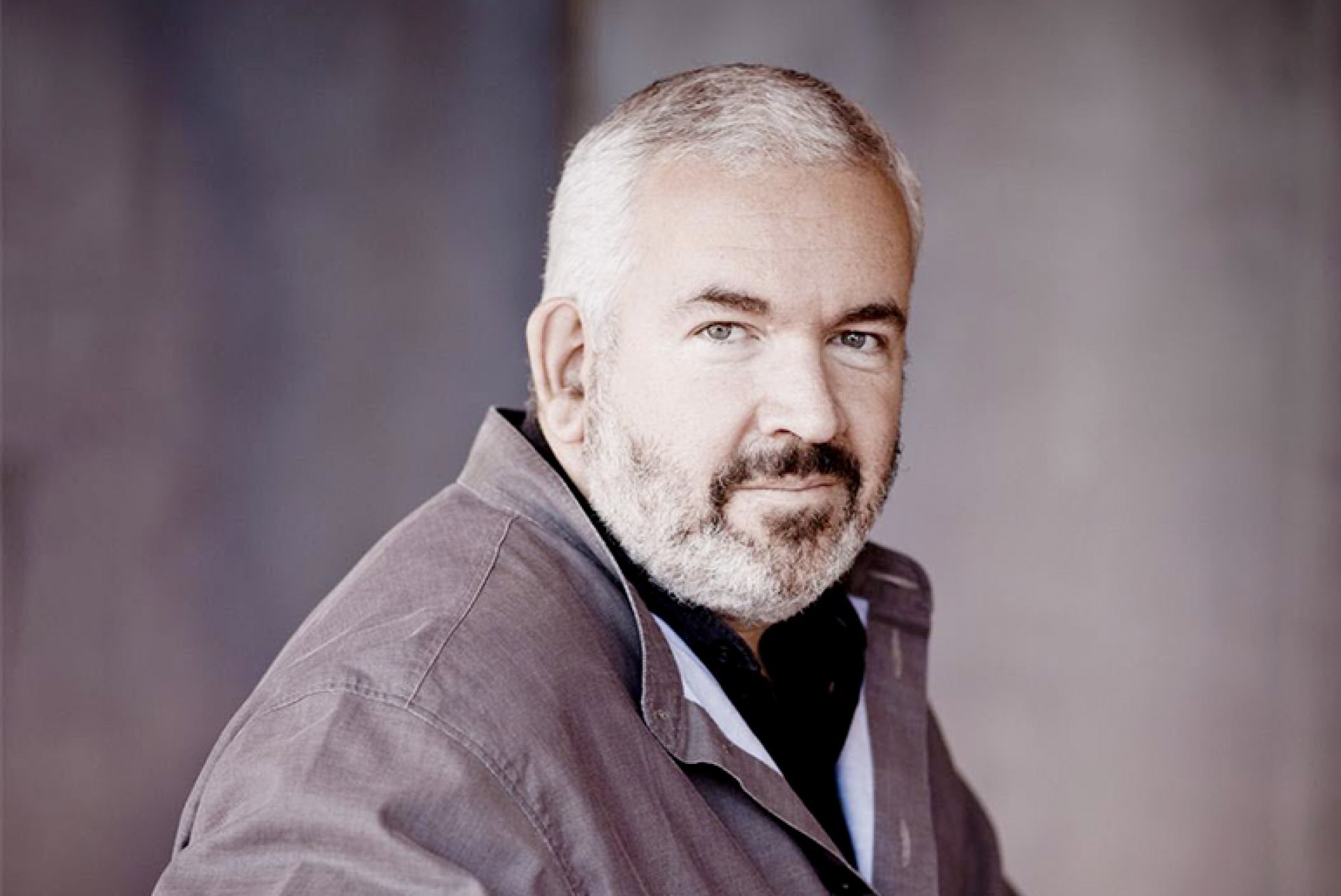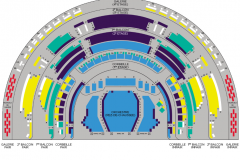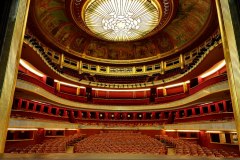Così fan tutte
September 2024 | ||||||
|---|---|---|---|---|---|---|
Mo | Tu | We | Th | Fr | Sa | Su |
The nineteenth century attempted to consign Così to oblivion. It was accused of being immoral. Yet the work is actually one of the gems of the libertine movement which, despite originally being a literary trend, spread across Enlightenment Europe and fed into many other artistic spheres. Light-hearted, fickle and misogynistic, the work was criticised on almost every level at the time. Yet this is Mozart at his tenderest and most sensual. The libretto is full of delicious permutations and offers musicians a wide variety of situations and vocal ensembles. Is this all about the carefree attitude of youth challenged by the notion of fidelity or is it the perfect guide to the art of loving? Everyone can draw their own conclusion.
Production Théâtre des Champs-Elysées
Synopsis
Place: Naples
Time: the 18th century
Act 1
Scene 1: A coffeehouse
In a cafe, Ferrando and Guglielmo (two officers) express certainty that their fiancées (Dorabella and Fiordiligi, respectively) will be eternally faithful. Don Alfonso expresses skepticism and claims that there is no such thing as a faithful woman. He lays a wager with the two officers, claiming he can prove in a day's time that those two, like all women, are fickle. The wager is accepted: the two officers will pretend to have been called off to war; soon thereafter they will return in disguise and each attempt to seduce the other's lover. The scene shifts to the two women, who are praising their men (duet: "Ah guarda sorella"—"Ah look sister"). Alfonso arrives to announce the bad news: the officers have been called off to war. Ferrando and Guglielmo arrive, brokenhearted, and bid farewell (quintet: "Sento, o Dio, che questo piede è restio"—"I feel, oh God, that my foot is reluctant"). As the boat with the men sails off to sea, Alfonso and the sisters wish them safe travel (trio: "Soave sia il vento"—"May the wind be gentle"). Alfonso, left alone, gloatingly predicts that the women (like all women) will prove unfaithful (arioso: "Oh, poverini, per femmina giocare cento zecchini?"—"Oh, poor little ones, to wager 100 sequins on a woman").
Scene 2: A room in the sisters' home
Despina, the maid, arrives and asks what is wrong. Dorabella bemoans the torment of having been left alone (aria: "Smanie implacabili"—"Torments implacable"). Despina mocks the sisters, advising them to take new lovers while their betrotheds are away (aria: "In uomini, in soldati, sperare fedeltà?"—"In men, in soldiers, you hope for faithfulness?"). After they leave, Alfonso arrives. He fears Despina will recognize the men through their disguises, so he bribes her into helping him to win the bet. The two men then arrive, dressed as mustachioed Albanians (sextet: "Alla bella Despinetta"—"Meet the pretty Despinetta"). The sisters enter and are alarmed by the presence of strange men in their home. The "Albanians" tell the sisters that they were led by love to them (the sisters). However, the sisters refuse to give in. Fiordiligi asks the "Albanians" to leave and pledges to remain faithful (aria: "Come scoglio"—"Like a rock"). The "Albanians" continue the attempt to win over the sisters' hearts, Guglielmo going so far as to point out all of his manly attributes (aria: "Non siate ritrosi"—"Don't be shy"), but to no avail. Ferrando, left alone and sensing victory, praises his love (aria: "Un'aura amorosa"—"A loving breath").
Scene 3: A garden
The sisters are still pining. Despina has asked Don Alfonso to let her take over the seduction plan. Suddenly, the "Albanians" burst in the scene and threaten to poison themselves if they are not allowed the chance to woo the sisters. As Alfonso tries to calm them, they drink the "poison" and pretend to pass out. Soon thereafter, a "doctor" (Despina in disguise) arrives on the scene and, using magnet therapy, is able to revive the "Albanians". The men, pretending to hallucinate, demand a kiss from Dorabella and Fiordiligi (whom the "Albanians" call goddesses) who stand before them. The sisters refuse, even as Alfonso and the doctor (Despina) urge them to acquiesce.
Act 2
Scene 1: The sisters' bedroom
Despina urges them to succumb to the "Albanians"' overtures (aria: "Una donna a quindici anni"—"A fifteen year old woman"). After she leaves, Dorabella confesses to Fiordiligi that she is tempted, and the two agree that a mere flirtation will do no harm and will help them pass the time while they wait for their lovers to return (duet: "Prenderò quel brunettino"—"I will take the dark haired one").
Scene 2: The garden
Dorabella and the disguised Guglielmo pair off, as do Ferrando and Fiordiligi. The conversation is halting and uncomfortable, and Ferrando departs with Fiordiligi. Now alone with Dorabella, Guglielmo attempts to woo her. She puts up a token resistance, and soon she has given him a medallion (with Ferrando's portrait inside) in exchange for a heart-shaped locket (duet: "Il core vi dono"—"I give you my heart"). Ferrando is less successful with Fiordiligi (Ferrando's aria: "Ah, lo veggio"—"Ah, I see it" and Fiordiligi's aria: "Per pietà, ben mio, perdona"—"Please, my beloved, forgive"), so he is enraged when he later finds out from Guglielmo that the medallion with his portrait has been so quickly given away to a new lover. Guglielmo at first sympathises with Ferrando (aria: "Donne mie, la fate a tanti"—"My ladies, you do it to so many"), but then gloats, because his betrothed is faithful.
Scene 3: The sisters' room
Dorabella admits her indiscretion to Fiordiligi ("È amore un ladroncello"—"Love is a little thief"). Fiordiligi, upset by this development, decides to go to the army and find her betrothed. Before she can leave, though, Ferrando arrives and continues his attempted seduction. Fiordiligi finally succumbs and falls into his arms (duet: "Fra gli amplessi"—"In the embraces"). Guglielmo is distraught while Ferrando turns Guglielmo's earlier gloating back on him. Alfonso, winner of the wager, tells the men to forgive their fiancées. After all: "Così fan tutte"—"All women are like that".
Scene 4
The scene begins as a double wedding for the sisters and their "Albanian" grooms. Despina, in disguise as a notary, presents the marriage contract, which only the ladies sign. (The men, of course, realise that this wedding is a sham, and are only playing along with it in order to teach their unfaithful lovers a lesson.) Directly thereafter, military music is heard in the distance, indicating the return of the officers. Alfonso confirms the sisters' fears: Ferrando and Guglielmo are on their way to the house. The "Albanians" hurry off to hide (actually, to change out of their disguises). They return as the officers, professing their love. Alfonso drops the marriage contract in front of the officers, and, when they read it, they become enraged. They then depart and return moments later, half in Albanian disguise, half as officers. Despina has been revealed to be the notary, and the sisters realize they have been duped. All is ultimately forgiven, as the entire group praises the ability to accept life's unavoidable good times and bad times.
Program and cast
Sung in Italian, with French and English surtitles
Approximate running time 3 hours
Ana Maria Labin | Fiordiligi
Angela Brower | Dorabella
James Ley | Ferrando
Leon Košavić | Guglielmo
Miriam Albano | Despina
Alexandre Duhamel | Don Alfonso
Marc Minkowski | direction
Les Musiciens du Louvre
Théâtre des Champs-Élysées

The Théâtre des Champs- Elysées is undoubtedly one of the finest venues in Paris . Built in 1913 , it has the distinction of having been designed by a group of artists architects Henry Van de Velde and Auguste Perret , the painter and sculptor Antoine Bourdelle , the painter Maurice Denis , and the crystal- René Lalique to do mention the main ones . He was the first Parisian theater to be built entirely of reinforced concrete.
Restoration of the Great Hall devoted to operatic performances , symphony concerts and dance was decided in 1985. Two years later , on 23 September 1987, the theater reopened its doors , completely renovated. Fifteen years after this important work it was decided to undertake a new renovation campaign , but to prevent the complete closure of the theater for an entire season , work is now carried by step during the summer . Then it is to replace aging equipment , to remedy wear certain parts of the theater and improve spectator comfort and artists during their visit . Thus in recent years, including the work involved the renovation of marble facade, replacing the carpet in the room with wooden floors , installation of a new fully decorated wooden concert to a significant improvement of acoustics, the orchestra pit and stage below .
The Théâtre des Champs- Elysées is now a modern working tool receiving each year nearly 300,000 spectators and a few thousands of artists and collaborators.
The Théâtre des Champs- Elysées , the jewel of French architecture of the twentieth century, was in 1953 one of the first buildings of contemporary architectural heritage to be classified as historic monuments . Since 1970 the Caisse des Dépôts owns the entire building 15 avenue Montaigne and principal patron of the theater.
For over a century, Théâtre des Champs-Elysées has been the place where the most celebrated artists have come to make their names in Paris. The world’s finest orchestras and world-class soloists have always been a fixture at the Theatre. Théâtre des Champs-Elysées presents more than 200 concerts each year and is renowned for its outstanding performances of all genres, from classical music concerts and staged opera to contemporary dance and jazz.
How to reach us:
Subway: Alma-Marceau (line 9), Franklin D.Roosevelt (line 1), Pont de l’Alma (RER line C)
Bus: n° 42, 63, 72, 80, 92
Taxi station: Place de l’Alma, corner of avenue George V
Car park: Alma George V. The entrance is in front of n° 19, avenue George V
Fixed rate depending on the length of the performance. Payment upon entering.
Performances: Mo 08 Jul 2024,
Performances: Su 07 Jul 2024,
Performances: Fr 20 Dec 2024,
Performances: Su 07 Jul 2024,
Performances: Su 07 Jul 2024,
Performances: Fr 12 Jul 2024,

 EN
EN DE
DE IT
IT FR
FR ES
ES RU
RU JP
JP RO
RO
 Seating plan
Seating plan 





